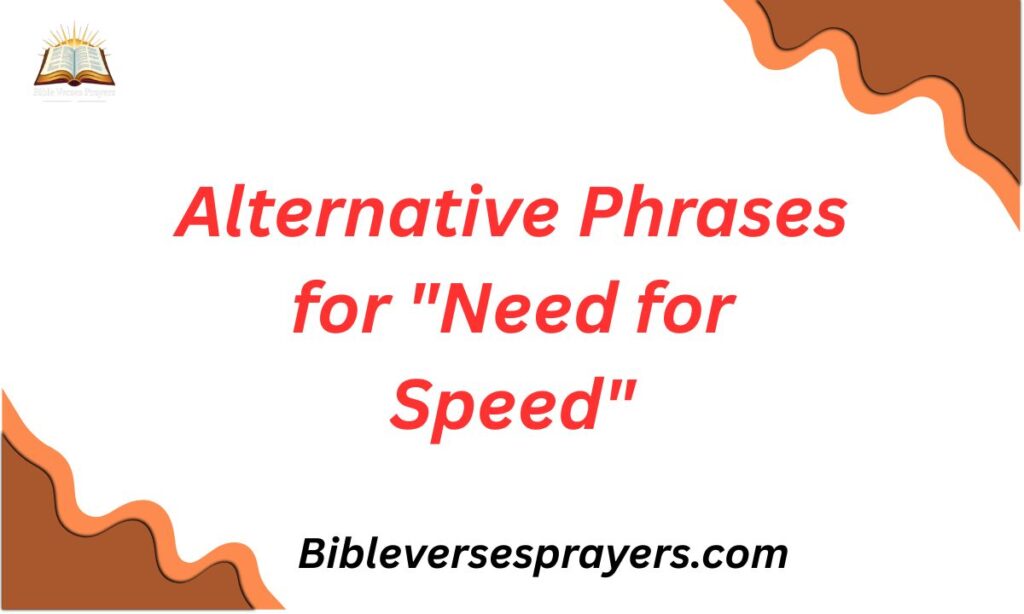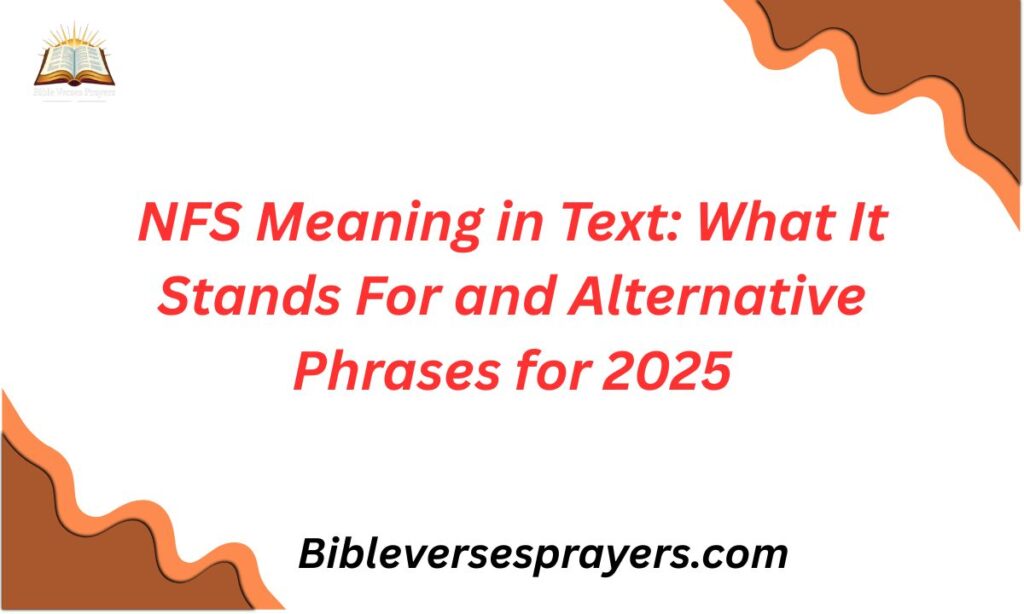In today’s digital world, abbreviations and acronyms are widely used in text messaging and online conversations. One such acronym that often appears is NFS. Depending on the context, NFS can have multiple meanings, including:
Not For Sale – Commonly used in online marketplaces or when someone is clarifying that an item is unavailable for purchase.
No Funny Stuff – Sometimes used to set a serious tone in a conversation.
Need For Speed – Refers to the popular video game franchise or a preference for fast action.
Not Feeling Social – A way to express the need for solitude or a break from social interactions.
While “NFS” is widely understood in casual texting, there are times when using a clearer, more appropriate alternative can improve communication. This article explores different ways to express what “NFS” stands for, offering polite, professional, and casual alternatives for different situations.
1. Alternative Phrases for “Not For Sale”
When you want to indicate that something is not available for purchase, consider these options:
Polite Alternatives:
- “This item is currently not available for purchase.” This phrase provides a gentle way to decline without seeming dismissive. It leaves room for future possibilities while clearly stating current unavailability.
- “I’m sorry, but this is not for sale.” A simple apology softens the rejection and shows consideration for the person’s interest.
- “This is a personal item and not for sale at the moment.” This alternative explains why the item isn’t available while maintaining politeness.
- “Thank you for your interest, but this item is not available for purchase.” Expressing gratitude for their interest maintains positive relationships.
- “I appreciate you asking, but I’m not selling this one.” This shows acknowledgment of their inquiry while firmly declining.
Professional Alternatives:
- “Thank you for your interest, but this item is not available for sale.” This maintains professional courtesy while clearly communicating unavailability.
- “This product is currently not listed for sale.” A business-like explanation that suggests organized inventory management.
- “At this time, we are not selling this item.” Professional language that indicates potential future availability.
- “This item is not part of our current sales inventory.” Formal business terminology that clearly explains the situation.
- “We appreciate your inquiry, but this product is not available for commercial purchase.” Comprehensive professional response that covers all bases.
Casual Alternatives:
- “Not selling, just showing!” A playful way to indicate you’re sharing something for appreciation rather than sale.
- “This is mine, not for sale!” Direct and friendly, perfect for casual conversations with friends.
- “Sorry, keeping this one for myself!” Shows attachment to the item in a lighthearted way.
- “Nah, this baby’s not going anywhere!” Uses affectionate language to express your intention to keep the item.
- “Just admiring, not selling!” Perfect for social media posts where you’re showcasing something you love.
Example in a Conversation:
Person 1: “Hey, is that jacket up for grabs?” Person 2: “Sorry, not for sale! It’s one of my favorites and has sentimental value.”
Person 1: “Are you selling those vintage sneakers?” Person 2: “Thanks for asking, but they’re not available for purchase right now.”
2. Alternative Phrases for “No Funny Stuff”
If you’re using “NFS” to set boundaries or establish seriousness, these alternatives work well:
Polite Alternatives:
- “Let’s keep things straightforward, please.” This gently requests directness without sounding harsh or demanding.
- “I’d appreciate it if we could keep this professional.” Sets clear expectations while maintaining courtesy and respect.
- “Let’s stick to the topic at hand.” Redirects conversation focus without dismissing the person entirely.
- “Could we maintain a serious tone for this discussion?” Politely requests appropriate behavior for the situation.
- “I’d prefer if we focused on the important matters.” Guides conversation toward relevant topics diplomatically.
Professional Alternatives:
- “Please maintain a professional approach.” Clear, direct instruction appropriate for workplace settings.
- “I’d prefer if we kept this discussion serious.” Professional language that sets clear expectations.
- “Let’s ensure we stay focused on the matter at hand.” Combines professionalism with clear direction.
- “This matter requires serious attention and professional handling.” Emphasizes importance while requesting appropriate behavior.
- “I need this conversation to remain business-focused.” Leaves no room for misinterpretation in professional contexts.
Casual Alternatives:
- “No games, please!” Direct but friendly way to request seriousness from friends.
- “Let’s keep it real!” Casual language that still conveys the need for honesty and directness.
- “Just straight talk, okay?” Informal request for honest, direct communication.
- “Cut the jokes, I’m being serious here!” Friendly but firm way to shift conversation tone.
- “Real talk time!” Casual phrase that signals a shift to serious discussion.
Example in a Conversation:
Person 1: “Are you really selling this at that price? Just kidding around!” Person 2: “Actually, let’s keep this serious – I really need a fair offer here.”
Person 1: “So about this business deal… or should I say ‘business deal’?” Person 2: “Let’s maintain a professional approach – this is important to both of us.”
3. Alternative Phrases for “Need for Speed”

When referring to speed or urgency, you can use different expressions depending on the context:
Polite Alternatives:
- “I need this done quickly, please.” A courteous way to express urgency without seeming demanding.
- “Could we move a little faster on this?” Gentle request for acceleration that maintains politeness.
- “Speed is a priority for me in this case.” Explains your needs while remaining respectful.
- “I’d appreciate if we could expedite this process.” Professional courtesy combined with urgency.
- “Time is somewhat pressing on this matter.” Indicates urgency while allowing for some flexibility.
Professional Alternatives:
- “This project requires a fast turnaround.” Clear business language that sets expectations.
- “Timeliness is crucial for this task.” Professional way to emphasize the importance of speed.
- “I’d appreciate an expedited process if possible.” Business-appropriate request that maintains courtesy.
- “This matter requires immediate attention.” Professional urgency that conveys importance.
- “Priority processing is needed for this request.” Business terminology that indicates high importance.
Casual Alternatives:
- “Let’s hurry up!” Direct, informal way to encourage faster action.
- “I’m in a rush!” Simple, casual expression of time pressure.
- “Fast and furious mode activated!” Playful reference that conveys urgency with humor.
- “Speed demon time!” Fun way to indicate the need for quick action.
- “Let’s kick it into high gear!” Energetic casual expression for acceleration.
Example in a Conversation:
Person 1: “Hey, can you send me that file?” Person 2: “Sure! Are you in a rush, or is regular timing okay?”
Person 1: “When do you need this project completed?” Person 2: “I’m working against a tight deadline – timeliness is crucial here.”
4. Alternative Phrases for “Not Feeling Social”
Sometimes, people use “NFS” to express that they’re not in the mood to socialize. Here are some better ways to phrase this:
Polite Alternatives:
- “I need some alone time today.” Honest explanation that most people can understand and respect.
- “I’m taking a break from socializing.” Clear indication of temporary unavailability for social activities.
- “I appreciate the invite, but I’m keeping to myself today.” Shows gratitude while clearly declining.
- “I’m not up for social activities at the moment.” Direct but polite way to express current state.
- “I need to recharge with some personal time.” Positive framing of alone time as self-care.
Professional Alternatives:
- “I need a personal day to recharge.” Professional language that emphasizes self-care and well-being.
- “I’m focusing on some personal matters today.” Business-appropriate way to indicate unavailability.
- “I’m not available for social engagements at the moment.” Clear professional boundary setting.
- “I’m maintaining work-life balance today.” Uses business terminology to explain personal boundaries.
- “I need time for personal well-being.” Professional emphasis on mental health and self-care.
Casual Alternatives:
- “Not in the mood to chat, catch you later!” Friendly but direct way to postpone social interaction.
- “Taking a break from social life today.” Clear, casual explanation of current needs.
- “Offline mode activated!” Playful way to indicate temporary social unavailability.
- “Just need some me-time!” Casual, widely understood expression for personal space needs.
- “People-ing is hard today!” Humorous way to express social exhaustion that many relate to.
Example in a Conversation:
Person 1: “Want to hang out later?” Person 2: “I appreciate the invite, but I’m not feeling social today. Let’s plan something for this weekend?”
Person 1: “There’s a group dinner tonight – you should join us!” Person 2: “Thanks for thinking of me, but I need some alone time to recharge.”
5. Optimized Texting Examples
Here are practical texting scenarios that demonstrate NFS alternatives in action:
- Marketplace Interactions: “Hey, is this guitar for sale?” / “Sorry, it’s not available for purchase – just showing my collection!”
“Can I buy your sneakers?” / “Thanks for asking, but they’re not on the market right now.”
“How much for that vintage jacket?” / “I’m keeping this one for myself, but I appreciate your interest!”
- Social Boundary Setting: “Let’s meet up tonight!” / “I need some personal time today, but let’s plan for another day.”
“Want to join our group chat?” / “I’m taking a break from social media right now, but thanks!”
- Business Communication: “Hey, can we talk business?” / “Of course, but let’s maintain a professional approach throughout.”
“Are you serious about this proposal?” / “Absolutely – let’s keep this discussion focused and straightforward.”
- Urgency Situations: “When do you need that report?” / “I’m working against a tight deadline – speed is essential here.”
“How quickly can you respond to emails?” / “This project requires immediate attention and fast turnaround.”
- Personal Space Requests: “Are you free for a call?” / “I’m not up for conversations right now, but let’s touch base tomorrow.”
“Want to video chat later?” / “I need some alone time today to recharge, maybe this weekend?”
Conclusion
The abbreviation NFS has multiple meanings in texting, and while it’s commonly used, it can sometimes lead to confusion or misunderstandings. Whether you’re talking about something that’s not for sale, setting boundaries, expressing urgency, or needing personal space, using a clear alternative phrase can help avoid confusion and improve communication effectiveness.
In 2025, as digital communication continues to evolve, the importance of clarity cannot be overstated. While acronyms like NFS save time and characters, they can create barriers to understanding, especially in diverse online communities where people have different levels of internet literacy.
By choosing the right tone—whether polite, professional, or casual—you can ensure your message is received as intended. Consider your audience, the context of your conversation, and the potential for misunderstanding when deciding between using NFS or a more explicit alternative.
Frequently Asked Questions
What does NFS stand for in text messages?
NFS most commonly stands for “Not For Sale,” “No Funny Stuff,” “Need For Speed,” or “Not Feeling Social,” depending on the conversation context.
When should I avoid using NFS in my messages?
Avoid using NFS in formal business communications, when communicating with people who might not understand internet slang, or when absolute clarity is essential to prevent misunderstandings.
Is NFS appropriate for professional communications?
Generally, it’s better to use complete phrases in professional settings to ensure clear communication and maintain a professional tone. Full phrases are more universally understood.






